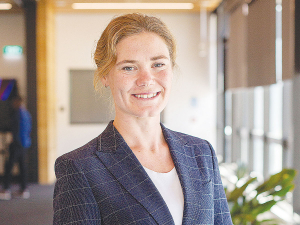A food scientist from the Riddet Institute has wowed judges at an international dairy industry award, confirming the Palmerston North institute's strength in milk research.
Riddet Institute post-doctoral researcher Natalie Ahlborn is heading to Paris in October after coming second in the International Dairy Federation (IDF) Professor Pavel Jelen Early Career Scientist Prize.
This is not the first time Riddet Institute scientists have been recognised. In 2022, two Riddet Institute scientists took out top spots in the same award; Dr Debashree Roy was second and Dr Nick Smith was fourth.
The IDF is an international authority in the development of science-based standards for the global dairy sector, with the prize specifically for scientists who gained their highest degrees three years ago or less.
Ahlborn has been researching processed milk and its effects on digestion and nutrient absorption, as part of the Ministry of Business, Innovation and Employment (MBIE) funded 'New Zealand Milk Means More' research programme at the Riddet Institute, based at Massey University in Palmerston North. Pasteurisation, UHT treatment, and homogenisation are commonly used to process milk, but Ahlborn wanted to know what these treatments mean for digestion and nutrient uptake.
She examined milk nutrient digestion and absorption in the gastrointestinal tract, finding that the protein in UHT milk was digested the fastest, followed by the protein in pasteurised homogenised milk, then pasteurised non-homogenised and, finally, raw milk. Curd formation and stomach emptying of solid matter and lipids were also measured. There were substantial differences in digestion of the fats and solid portions of the milks.
The research has created a fundamental understanding of how processing affects the gastric digestion of milk protein, and how this might contribute to milk's nutritional outcomes. Ahlborn says the findings could lead to tailored milk products that deliver superior nutritional value to consumer populations with different nutritional needs, such as those of athletes or the elderly.
"As the global population grows and ages, the need for quality nutrition is paramount, and this research could contribute to meeting this need."
Ahlborn will receive a printed certificate recognising the achievement and an honorarium of €200 (NZ$360). She will attend the IDF World Dairy Summit 2024 to be held in Paris, France, from 15 to 18 October 2024 to collect her award and present her research.
The IDF Professor Pavel Jelen Early Career Scientist Prize was created to acknowledge the work of scientists and/or technologists in the dairy science and technology field and aimed toward 'early career' scientists, including graduate and postgraduate students.
It is named in honour of Professor Pavel (Paul) Jelen, a Czech-born scientist and educator who researched dairy science and technology, and was known for encouraging, mentoring, and educating students, early-career scientists, and technologists.
The IDF is the leading source of scientific and technical expertise for all stakeholders of the dairy chain. Since 1903, IDF has provided a mechanism for the dairy sector to reach a global consensus on how to help feed the world with safe and sustainable dairy products.
The Riddet Institute is a New Zealand Centre of Research Excellence and is hosted by Massey University in Palmerston North.


















